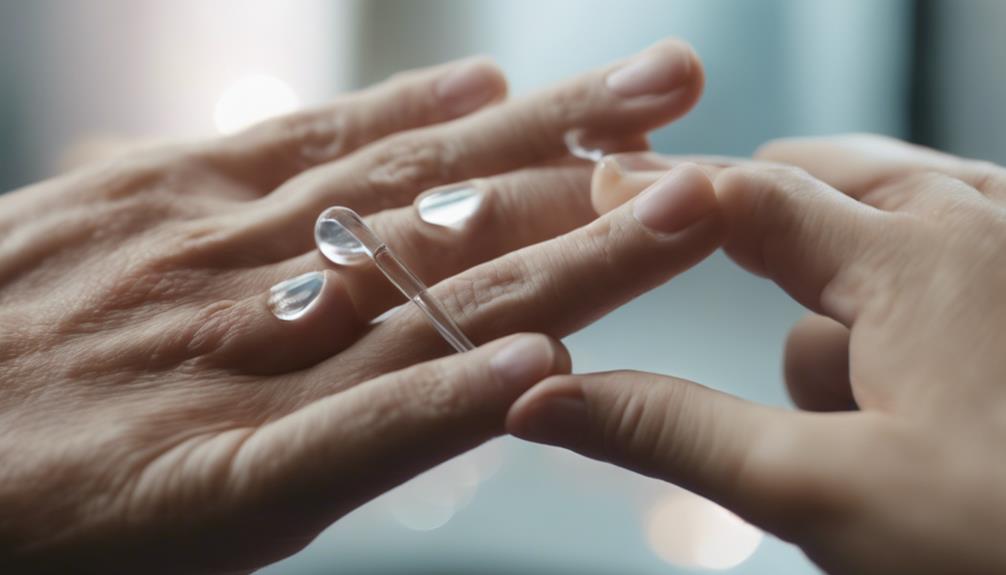Which Gender Grows Nails Faster?

Men generally grow nails faster than women due to hormonal influences and genetic factors. Hormones, like testosterone, promote quicker nail growth. Overall, women tend to have slower nail growth rates. These differences in growth speed are largely shaped by biological factors. Discover more on how genetics and hormonal balances contribute to nail growth variations.
Key Takeaways
- Men generally experience faster nail growth due to hormonal and genetic factors.
- Hormones like testosterone contribute to quicker nail growth in males.
- Genetic predispositions play a role in the gender-based differences in nail growth rates.
- Individual variations exist, but overall, men tend to have faster nail growth.
- Hormonal balance, influenced by gender, affects the speed of nail growth.
Factors Affecting Nail Growth Rates

When it comes to understanding nail growth rates, various factors play a crucial role in determining the speed at which your nails grow. One significant factor is genetics. Your genes can influence how fast your nails grow, so if you come from a family of fast nail growers, chances are you might experience the same.
Another key element is nutrition. Eating a balanced diet rich in vitamins and minerals can promote healthy nail growth. Hydration is vital too; make sure you drink enough water every day to keep your nails hydrated and growing strong.
Additionally, age and overall health can impact nail growth rates. Younger individuals tend to have faster nail growth compared to older people. Lastly, environmental factors like climate and season can also affect how quickly your nails grow.
Understanding Nail Growth Cycle
To grasp the intricacies of the nail growth cycle, it's essential to understand the stages involved in the process. Your nails grow in three main phases:
- The Anagen phase where the nail actively grows, influenced by factors like age, diet, and overall health. This phase can last anywhere from a few weeks to several months, determining how long your nails can grow.
- The Catagen phase where growth slows down, acting as a transitional period preparing the nail for the resting phase.
- The Telogen phase where the nail rests before eventually falling out, allowing the nail to regenerate and making way for a new nail to grow.
Understanding this cycle can help you appreciate why your nails grow at different rates and why they may appear stronger or weaker at certain times.
Genetic Influence on Nail Growth

Influencing the rate at which your nails grow, genetics play a significant role in determining the speed and strength of your nail growth. Your genetic makeup can dictate various factors, including how quickly your nails grow, how strong they are, and even their overall appearance. Check out the table below for some interesting insights into how genetics can impact your nail growth:
| Genetic Factor | Influence on Nail Growth |
|---|---|
| Genes from parents | Determine growth rate |
| Genetic disorders | May affect nail health |
| Nail thickness gene | Influences strength |
| Keratin production | Affects nail growth speed |
| Nail bed structure | Impacts overall nail shape |
Understanding these genetic influences can help you comprehend why your nails may grow at a certain pace or why they may be prone to breaking easily. Remember, while genetics play a significant role, there are other factors at play too, which we will delve into shortly.
Hormonal Impact on Nail Growth
Your hormones play a significant role in determining the pace at which your nails grow.
For individuals who menstruate, the different phases of the menstrual cycle can impact nail growth.
Understanding how hormonal fluctuations affect nail health can provide insights into how to better care for your nails.
Hormones and Nail Growth
Hormones play a significant role in determining the rate at which nails grow. The balance of hormones in your body can impact the speed of nail growth. For example, during pregnancy, hormonal changes can lead to increased nail growth, while certain health conditions affecting hormone levels may slow down nail growth.
Testosterone, a hormone more prevalent in males, can contribute to faster nail growth compared to estrogen, which is more common in females. Keeping your hormones in balance through a healthy lifestyle can help maintain optimal nail growth. Understanding how hormones affect nail growth can empower you to make choices that support strong and healthy nails.
Menstrual Cycle Influence
During your menstrual cycle, changes in hormone levels can impact the rate at which your nails grow. Hormones like estrogen and progesterone fluctuate throughout the menstrual cycle, affecting various bodily functions, including nail growth. Estrogen, which peaks during the first half of the cycle, is known to promote nail health and growth. On the other hand, progesterone, which increases during the second half of the cycle, may lead to slower nail growth. These hormonal changes can result in differences in nail growth speed during different phases of the menstrual cycle.
| Menstrual Cycle Phase | Hormone Levels | Nail Growth |
|---|---|---|
| Follicular Phase | Estrogen | Faster |
| Luteal Phase | Progesterone | Slower |
Nail Growth Disparities Among Genders

When it comes to nail growth disparities among genders, it's essential to consider how gender can influence the rate at which nails grow.
Hormones play a significant role in this process, affecting the speed and strength of nail growth.
Additionally, genetic factors can also impact how fast nails grow, leading to differences between individuals of different genders.
Gender and Nail Growth
While genetics play a significant role in the rate of nail growth, research has shown that gender also influences the speed at which nails grow. Men's nails tend to grow faster than women's, with some studies suggesting a slightly quicker growth rate of up to 0.1 millimeters per month. However, individual variations exist, and not all men will have faster-growing nails than all women.
Factors like age, health, and even the season can also impact nail growth rates. So, if you're wondering why your nails may seem to grow at a different pace compared to someone of a different gender, remember that while gender plays a part, it's not the only factor influencing nail growth.
Hormones Influence Growth
Gender disparities in nail growth rates can be attributed to the influence of hormones on the process. Hormones play a vital role in regulating the speed at which your nails grow.
For example, during puberty, both males and females experience hormonal changes that can impact nail growth. Testosterone, more prevalent in males, tends to promote faster nail growth, while estrogen, more dominant in females, can result in slower growth. These hormonal differences can lead to varying nail growth rates among genders.
Understanding how hormones affect nail growth is essential for comprehending why individuals may observe differences in the rate at which their nails grow. Keep in mind that these hormonal influences can contribute to the disparities in nail growth between genders.
Genetic Factors at Play
Exploring the role of genetic factors in influencing nail growth rates reveals intriguing disparities among genders. Your DNA plays a significant part in determining how fast your nails grow.
Studies suggest that certain genes related to nail health and growth are more active in individuals assigned female at birth. These genes can influence the speed at which your nails grow, potentially giving those assigned female at birth an edge in nail growth compared to those assigned male at birth.
While genetic factors aren't the sole determinants of nail growth, they certainly contribute to the differences observed among genders. Embracing and understanding these genetic disparities can offer insight into why nail growth rates vary between individuals.
Debunking Nail Growth Myths

Many people mistakenly believe common myths about nail growth that can be debunked through scientific understanding. One prevalent myth is that nails continue to grow after death. In reality, what occurs is that the skin around the nails retracts as it dehydrates post-mortem, creating the illusion of nails growing.
Additionally, the idea that applying gelatin can strengthen nails isn't entirely accurate. While gelatin contains protein, which is essential for nail health, the body doesn't selectively send this protein to the nails upon consumption. Instead, a balanced diet rich in various nutrients is key for promoting healthy nail growth.
Another myth suggests that tapping your nails on a hard surface can make them grow faster. In truth, nail growth is determined by factors like genetics, age, and overall health, rather than external stimuli. By understanding these myths and the science behind nail growth, you can make informed choices to support the health of your nails.
Frequently Asked Questions
Can Nail Growth Rates Be Influenced by Diet or Nutrition?
Boosting nail growth through diet is possible. Including foods high in biotin, protein, and vitamins A and C can aid in strengthening nails. Remember, nutrition plays a vital role in maintaining healthy and strong nails.
Are There Any Benefits to Using Nail Growth Products or Supplements?
Using nail growth products or supplements may provide benefits such as stronger nails, faster growth, and improved overall nail health. Remember to consult with a professional before starting any new regimen.
Can Stress or Mental Health Affect Nail Growth?
When it comes to nail growth, stress and mental health can indeed have an impact. High stress levels or poor mental health can slow down the growth process, affecting the health and appearance of your nails.
Are There Any Environmental Factors That Could Impact Nail Growth?
In your life's garden, various factors can influence your nail growth. From diet to climate, nurture your nails with care. Remember, just as a plant needs the right environment to thrive, so do your nails.
Is There a Correlation Between Nail Growth and Overall Health or Wellness?
When it comes to nail growth, your overall health and wellness can play a role. Factors like diet, hydration, and circulation can impact how fast your nails grow. Taking care of yourself can benefit your nails.




